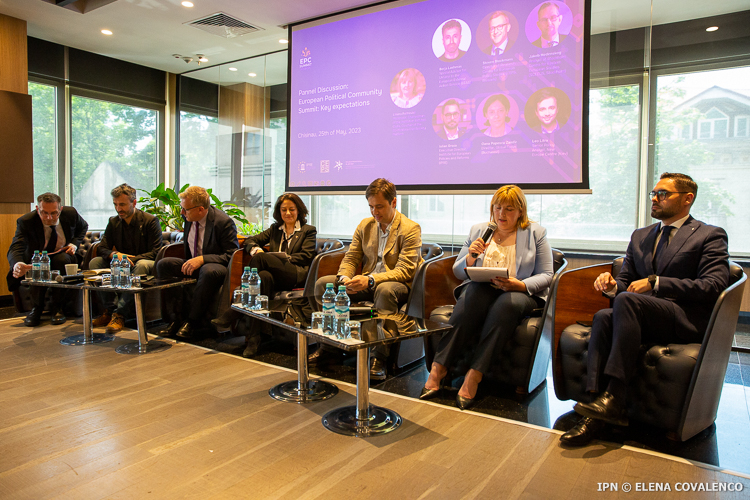The European Political Community now functions rather as a high-level informal platform on which European leaders come together to discuss subjects of common interest and try to identify eventual solutions so as to bring peace and stability on the European continent, said participants in a conference entitled “Main subjects and expectations of the European Political Community Summit”, IPN reports.
Iulian Groza, executive director of the Institute for European Policies and Reforms (IPRE), said the EPC Summit is an opportunity for promoting, supporting the states to have a more active role at geopolitical level in the region and the fact that the Republic of Moldova was chosen to host this summit in connection with the war in a Ukraine is already a powerful signal of solidarity and not only with Ukraine, but also with the Republic of Moldova. “The European integration path of the Republic of Moldova depends primarily on what we do at internal level, on the assumed reforms, on the way in which pass on this information and in which we advance on this path,” stated Iulian Groza.
He noted that Moldova’s integration into the EU depends a lot on the end result of the war in Ukraine and on how Moldova advances on the European path. It should simultaneously do its best to support Ukraine and be part of this coalition of support for Ukraine, which is important for the region and for the country too.
The participants in the conference – experts from the Republic of Moldova and from abroad – agreed that the EPC platform enables the European leaders to state their commitments related to joint actions on issues of major interest.
Steven Blockmans, director of research at the Center for European Policy Studies, said that this political construct, the EPC, will facilitate the verbalization of particular intentions that can later materialize into concrete steps. However, increased transparency in the objectives and actions of this community is necessary. “Transparency is a key element and I would say that this is somehow absent in the context of the EPC. No written document, fragmentary news conferences. We see here particular dissonance with the verbalized commitments. The civil society organizations here play a very important role in supporting these efforts, in gradually increasing transparency in the decisions taken and commitments undertaken at the EPC level in the form of signed documents and they should further monitor the real implementation of these ideas,” stated Steven Blockmans.
Asked if he considers that the EPC platform is the most suitable one for having discussions on security, especially in the context of the war in Ukraine, Jakob Hedenskog, analyst at Stockholm, Center for Eastern European Studies, said the EPC cannot substitute NATO or the other organizations. The EPC should be considered not a substitute to enlargement, but a format, including for dialog. Ukraine will need to obtain particular security guarantees for the future and these could be offered only by NATO.
Director of Globus Focus Bucharest Oana Popescu Zamfir said that she has a more skeptical attitude to the EPC as an organization, but is not skeptical about the functionality of this community. “To be sincere, the reason for this skepticism as an organization is the fact that there is particular overlapping with existing organizations and the EPC was born in a more vague and uncertain period and does not have a well-defined structure. This institution brings together heads of state and government and is very politicized, which is it is not an institution of managers who need to fulfill particular tasks. The value of the European Political Community could depend on the political conversations that will be held.
The conference centering on the European Political Community Summit was organized by the Institute for European Policies and Reforms (IPRE) in cooperation with the Center for European Policy Studies (CEPS), the Open Society Foundations, the National Platform of the Eastern Partnership Civil Society Forum and in partners with the Ministry of Foreign Affairs and European Integration of the Republic of Moldova.
previous post


